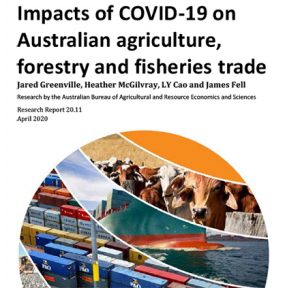The global spread of COVID-19 is making the short-term outlook for Australia’s agricultural sectors increasingly uncertain according to the ABARES Impacts of COVID-19 on Australian agriculture, forestry and fisheries trade report. Source: Timberbiz
ABARES Actng Executive Director, Peter Gooday, said the report highlighted the spread of the virus would have an impact on our trade.
“The International Monetary Fund (IMF) is currently forecasting a 3% contraction in global economic activity in 2020—worse than the global financial crisis,” Mr Gooday said.
“However, because agricultural exports principally relate to food, trade will continue, and consumers will continue to want Australian agricultural products. The key impact on global agricultural markets is likely to be softer prices from falling incomes and changes in where food is consumed rather than significantly reduced consumption for most products.
“In the early days of the virus Australian agriculture’s exposure to China was a risk.
“The most exposed products were those typically associated with restaurants and cafés, and those feeding into manufacturing processes. We saw a drop in seafood exports but many other exports continued.
“China’s success in controlling the spread of the virus has allowed it to loosen restrictions and put its economy on a path to recovery. Provided the recovery is sustained, the negative impacts on Australia’s trade with China may be limited.
“However, with the virus now spreading well beyond China, second and third waves of impacts on Australia’s agricultural, forestry and fisheries sectors are likely.
“In the immediate future, supply chain and logistics disruptions will create the most significant risk to the sector and hence to producer incomes. The Government has taken a number of steps to keep agriculture producing and our food and fibre reaching export markets, significantly reducing these risks.”
International trade policy responses to the COVID-19 pandemic have so far been concentrated around restricting wheat and rice trade. However, this is expected to have limited impacts on Australian producers and consumers.
“Global stocks of major grains are currently very high, the outlook for global production is good, and the current restrictions are not expected to affect global markets significantly”, Mr Gooday said.
“Despite the pandemic, it is the recent difficult seasonal conditions in Australia that will continue to dominate industry fortunes over the short term.
“While recent improvements in seasonal conditions will ease pressures on primary producers, the effects of COVID-19 compound the impacts on the sector from drought and this summer’s bushfires.
“While there is considerable uncertainty in the outlook with the spread of COVID-19, the underlying medium-term prospects for the agriculture sector remain strong.”
To read the report visit https://www.agriculture.gov.au/abares/research-topics/trade/impacts-of-COVID-19-on-Australian-trade






